Unit 3 Online tours.(Grammar)
文档属性
| 名称 | Unit 3 Online tours.(Grammar) |

|
|
| 格式 | zip | ||
| 文件大小 | 227.5KB | ||
| 资源类型 | 教案 | ||
| 版本资源 | 牛津译林版 | ||
| 科目 | 英语 | ||
| 更新时间 | 2015-09-28 00:00:00 | ||
图片预览



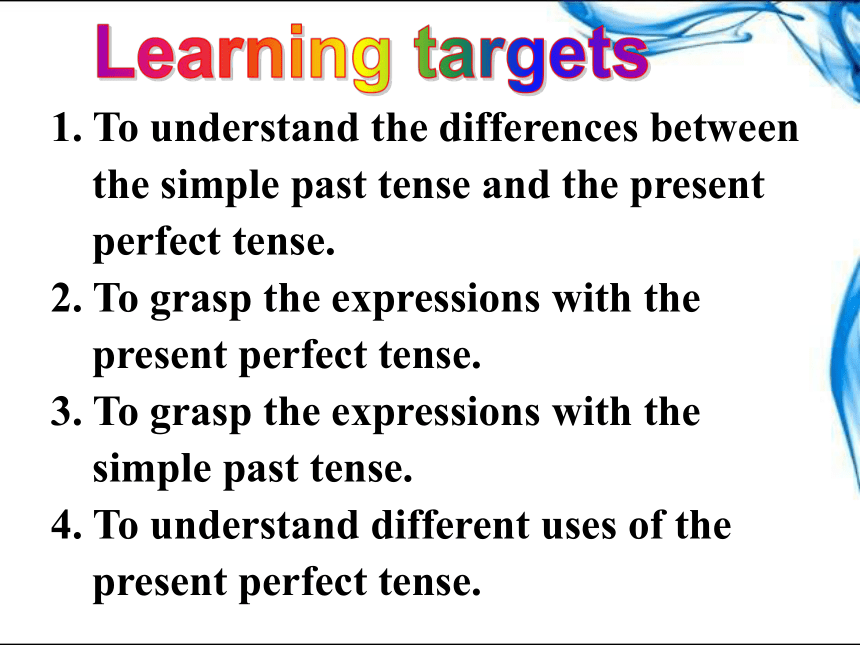


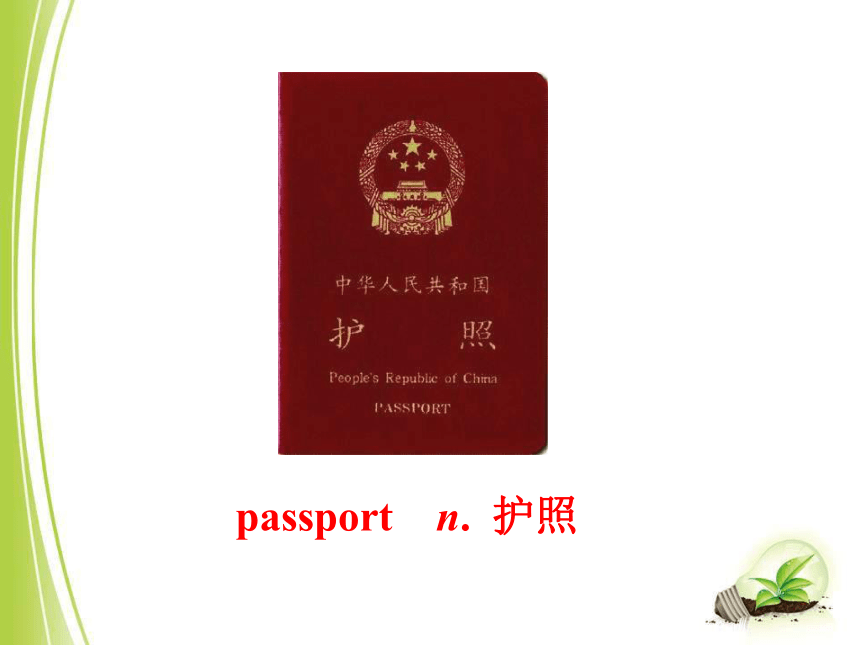
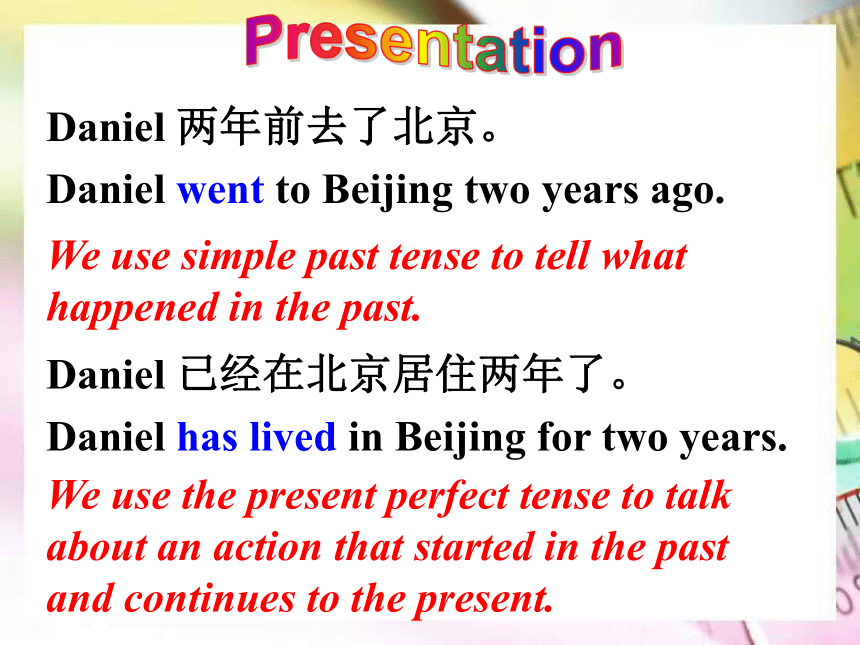
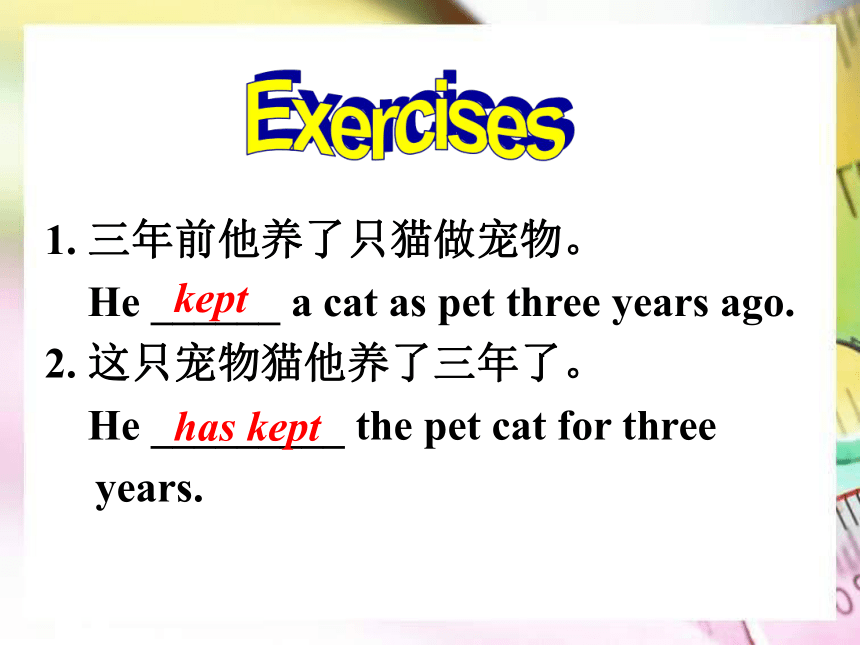
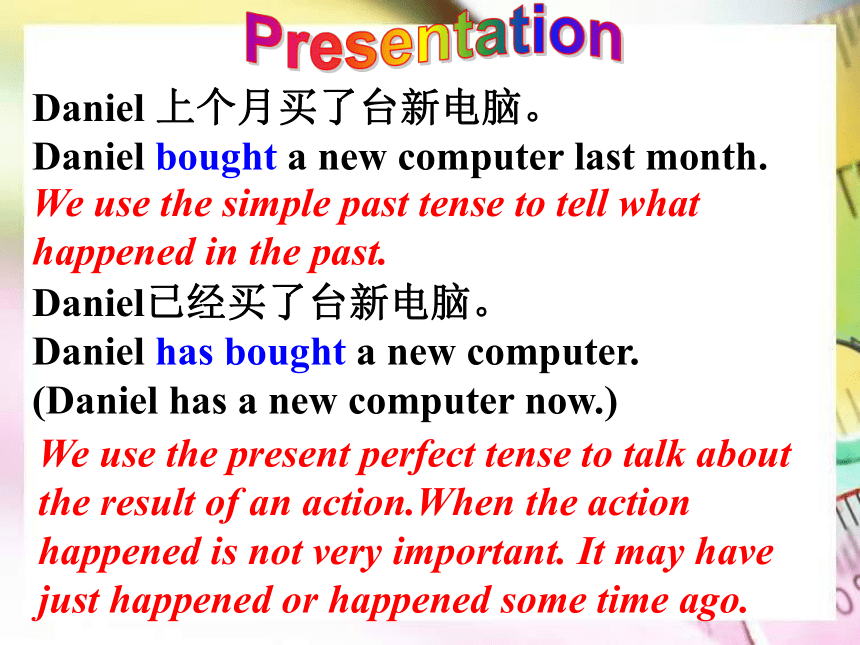
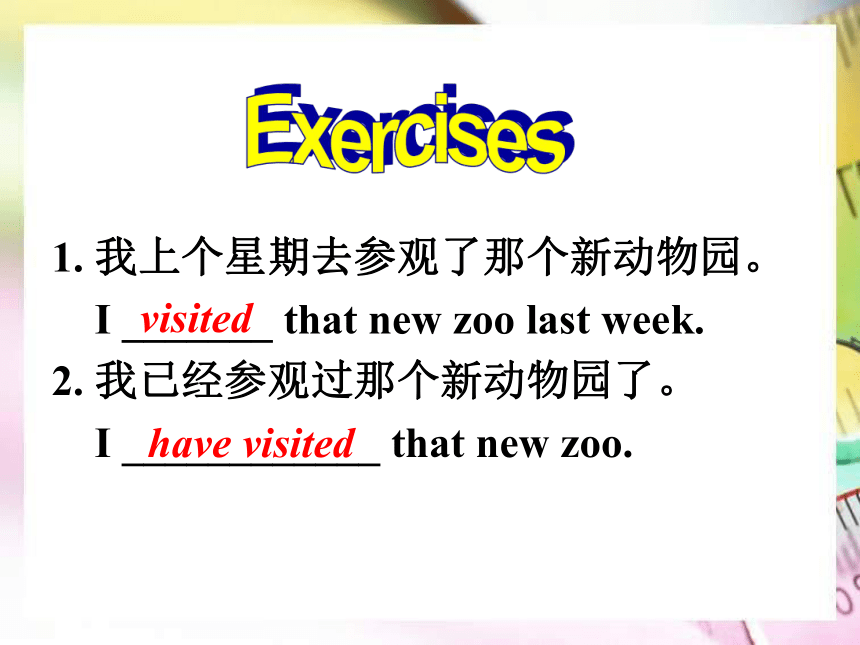
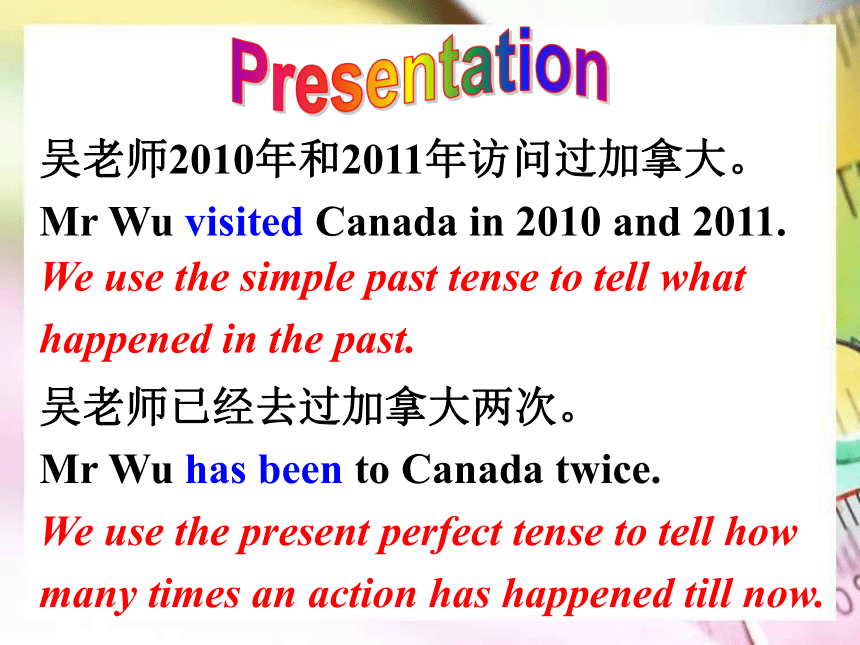
文档简介
课件39张PPT。Unit 3Unit 3
Online toursGrammar1. To understand the differences between the simple past tense and the present perfect tense.
2. To grasp the expressions with the present perfect tense.
3. To grasp the expressions with the simple past tense.
4. To understand different uses of the present perfect tense.Learning targets 完成句子。
1. 北京因万里长城而著名。
Beijing _____________ the Great Wall.
2. 这条河是个钓鱼的好地方。
This river is a _______________ fishing.
3. 我三天前听说过这件事。
I _________ this _______________.
4.自从2000年起,他就在上海工作了。
He __________ in Shanghai ______ 2000.is famous forgood place to goheard of three days agohas worked sincedream vi.& vt. 做梦,梦想
dream about/of 想象;梦想
e.g. Do you often dream at night?
你在夜里经常做梦吗?
I sometimes dream about my parents.
我有时梦见我的父母。
I dream of becoming a teacher.
我一心想当个教师。New wordspassport n. 护照Daniel 两年前去了北京。
Daniel went to Beijing two years ago.
Daniel 已经在北京居住两年了。
Daniel has lived in Beijing for two years.We use simple past tense to tell what happened in the past.We use the present perfect tense to talk about an action that started in the past and continues to the present.Presentation1. 三年前他养了只猫做宠物。
He ______ a cat as pet three years ago.
2. 这只宠物猫他养了三年了。
He _________ the pet cat for three years.kepthas keptExercisesDaniel 上个月买了台新电脑。
Daniel bought a new computer last month.
Daniel已经买了台新电脑。
Daniel has bought a new computer.
(Daniel has a new computer now.)We use the simple past tense to tell what happened in the past.We use the present perfect tense to talk about the result of an action.When the action happened is not very important. It may have just happened or happened some time ago.Presentation1. 我上个星期去参观了那个新动物园。
I _______ that new zoo last week.
2. 我已经参观过那个新动物园了。
I ____________ that new zoo.visitedhave visitedExercises吴老师2010年和2011年访问过加拿大。
Mr Wu visited Canada in 2010 and 2011.
吴老师已经去过加拿大两次。
Mr Wu has been to Canada twice.We use the simple past tense to tell what happened in the past.We use the present perfect tense to tell how many times an action has happened till now.Presentation1. 我上周看过这部电影。
I _____ this movie last week.
2. 我已经看过这部电影很多次。
I __________ this movie many times.sawhave seenExercisesSimon is showing Millie some pictures. Complete his sentences with the correct forms of the words in brackets.I ______ (visit) the Palace Museum with my grandparents the other day.I ________ (climb) Mount Huang last Summer.visitedclimbed_____ you ever _____ (try) the famous Tianjin Baozi?I am happy that I ___________
(learn) to swim. Have tried have learntMr Wu is asking the students to make sentences with the correct tenses. Help them complete the sentences with the correct forms of the words in brackets.1. I ________________ (finish/ just) my homework.
Millie ________ (finish) her homework 20 minutes ago.
2. I ______ (write) an email to my friend yesterday.
Daniel _________________ (write/ already) two emails.has already writtenhave just finishedwrotefinished3. I ______(be) in Hainan last week.
Some of our classmates _____________ (not be) to Hainan yet.
4. I __________ (live) in Sunshine Town since I was born.
Daniel _____ (live) in Nanjing in 2007.waslivedhave livedhaven not beenMillie has never been to Nanjing. She is asking Simon about the city. Complete their conversation with the correct forms of the words in brackets.Millie: ___________________
(you/be/ever) to Nanjing?
Simon: Yes. I(2)____________(be) there three times.
Millie: When (3)____________ (you/go) there last?
Simon: Last summer. I (4)______(spend) a week there.
Millie: (5)____________ (you/like) it?Have you ever beenhave beendid you gospentDo you likeSimon: Oh yes. I (6)_____ (have) a great time there. I (7)______ (visit) many places of interest and (8)____ (eat) lots of local food.
Millie: Lucky you! I (9)_______________
(be/never) there.hadvisitedatehave never beenMillie is writing about the USA in her diary. Complete her diary entry with the correct forms of the verbs in the box.Saturday, 15 March
Have you ever dreamt of travelling around the world without a passport? Yes, you can realize your dream by taking an online tour. Yesterday Danniel (1)_________ me an online tour of the USA. I (2)_____ never _____ so many wonderful pictrues before.showedhave seenLast week, I (3)_________ a book about the places of interest in the USA. I (4)_________ 20 pages already. It’s really interesting. My dad (5)_____ just _________ from the USA, but I (6) ______ never_______ there. I hope I can visit the USA some day.have beenboughthave readhasreturnedWe often use these time expressions with the simple past tense:
yesterday
the other day
last...
...agoWe often use these time expressions with the present perfect tense:
already up to now
ever until/till now
just so far
recently (not) yet Tips:some day 和 the other day 的区别:some day指将来“总有一天、有朝一日、终将、(日后)某一天”,谓语动词用一般将来时。如:
Your wishes will come true some day.
总有一天你的愿望会实现的。
Some day you’ll have to pay for what you have done.
总有一天你要为你的行为而付出代价的。 Tips:some day 和 the other day 的区别:the other day 相当于a few days ago, 意为“几天前、某天、那天、不久前”,句中用一般过去时。如:
I met her in the street the other day.
几天前我在街上碰见过她。
I bought the watch the other day.
这手表我是几天前买的。 1) 一般过去时表示过去某时发生的动作或单纯叙述过去的事情,强调动作;现在完成时为过去发生的,强调过去的事情对现在的影响,强调的是影响。Summary2) 一般过去时常与具体的时间状语连用,而现在完成时通常与模糊的时间状语连用,或无时间状语。
一般过去时的时间状语:yesterday, last week, … ago, in 1980, in October, just, now等,皆为具体的时间状语。现在完成时的时间状语:for, since, so far, ever, never, just, yet, till/until, up to now, in past years, always等,皆不确定的时间状语。
共同的时间状语:this morning, tonight, this April, now, already, recently, lately 等。3) 现在完成时可表示持续到现在的动作或状态,动词一般是延续性的,如:live, teach, learn, work, study, know。
一般过去时常用的非持续性动词有come, go, leave, start, die, finish, become, get married等。句子中如有过去时的时间副词(如yesterday, last week, in 1960)时,不能使用现在完成时,要用过去时。
(错)Tom has written a letter to his parents last night.
(对)Tom wrote a letter to his parents last night.?1. Mother ____ me a new coat yesterday. I _______ it on. It fits me well.
A. had made … have tried
B. made … have tried
C. has made … tried
D. made … tried ExercisesB 2. We _______ trees last Sunday. So far we _______ over 3,000 trees there.
A. planted; planted
B. planted; have planted
C. have planted; planted
D. have planted; have planted B 3. I _______ the way. I ________ here for quite many years.
A. knew … have lived
B. knew … live
C. know … have lived
D. know … live C Finish off the exercises in workbook.Homework
Online toursGrammar1. To understand the differences between the simple past tense and the present perfect tense.
2. To grasp the expressions with the present perfect tense.
3. To grasp the expressions with the simple past tense.
4. To understand different uses of the present perfect tense.Learning targets 完成句子。
1. 北京因万里长城而著名。
Beijing _____________ the Great Wall.
2. 这条河是个钓鱼的好地方。
This river is a _______________ fishing.
3. 我三天前听说过这件事。
I _________ this _______________.
4.自从2000年起,他就在上海工作了。
He __________ in Shanghai ______ 2000.is famous forgood place to goheard of three days agohas worked sincedream vi.& vt. 做梦,梦想
dream about/of 想象;梦想
e.g. Do you often dream at night?
你在夜里经常做梦吗?
I sometimes dream about my parents.
我有时梦见我的父母。
I dream of becoming a teacher.
我一心想当个教师。New wordspassport n. 护照Daniel 两年前去了北京。
Daniel went to Beijing two years ago.
Daniel 已经在北京居住两年了。
Daniel has lived in Beijing for two years.We use simple past tense to tell what happened in the past.We use the present perfect tense to talk about an action that started in the past and continues to the present.Presentation1. 三年前他养了只猫做宠物。
He ______ a cat as pet three years ago.
2. 这只宠物猫他养了三年了。
He _________ the pet cat for three years.kepthas keptExercisesDaniel 上个月买了台新电脑。
Daniel bought a new computer last month.
Daniel已经买了台新电脑。
Daniel has bought a new computer.
(Daniel has a new computer now.)We use the simple past tense to tell what happened in the past.We use the present perfect tense to talk about the result of an action.When the action happened is not very important. It may have just happened or happened some time ago.Presentation1. 我上个星期去参观了那个新动物园。
I _______ that new zoo last week.
2. 我已经参观过那个新动物园了。
I ____________ that new zoo.visitedhave visitedExercises吴老师2010年和2011年访问过加拿大。
Mr Wu visited Canada in 2010 and 2011.
吴老师已经去过加拿大两次。
Mr Wu has been to Canada twice.We use the simple past tense to tell what happened in the past.We use the present perfect tense to tell how many times an action has happened till now.Presentation1. 我上周看过这部电影。
I _____ this movie last week.
2. 我已经看过这部电影很多次。
I __________ this movie many times.sawhave seenExercisesSimon is showing Millie some pictures. Complete his sentences with the correct forms of the words in brackets.I ______ (visit) the Palace Museum with my grandparents the other day.I ________ (climb) Mount Huang last Summer.visitedclimbed_____ you ever _____ (try) the famous Tianjin Baozi?I am happy that I ___________
(learn) to swim. Have tried have learntMr Wu is asking the students to make sentences with the correct tenses. Help them complete the sentences with the correct forms of the words in brackets.1. I ________________ (finish/ just) my homework.
Millie ________ (finish) her homework 20 minutes ago.
2. I ______ (write) an email to my friend yesterday.
Daniel _________________ (write/ already) two emails.has already writtenhave just finishedwrotefinished3. I ______(be) in Hainan last week.
Some of our classmates _____________ (not be) to Hainan yet.
4. I __________ (live) in Sunshine Town since I was born.
Daniel _____ (live) in Nanjing in 2007.waslivedhave livedhaven not beenMillie has never been to Nanjing. She is asking Simon about the city. Complete their conversation with the correct forms of the words in brackets.Millie: ___________________
(you/be/ever) to Nanjing?
Simon: Yes. I(2)____________(be) there three times.
Millie: When (3)____________ (you/go) there last?
Simon: Last summer. I (4)______(spend) a week there.
Millie: (5)____________ (you/like) it?Have you ever beenhave beendid you gospentDo you likeSimon: Oh yes. I (6)_____ (have) a great time there. I (7)______ (visit) many places of interest and (8)____ (eat) lots of local food.
Millie: Lucky you! I (9)_______________
(be/never) there.hadvisitedatehave never beenMillie is writing about the USA in her diary. Complete her diary entry with the correct forms of the verbs in the box.Saturday, 15 March
Have you ever dreamt of travelling around the world without a passport? Yes, you can realize your dream by taking an online tour. Yesterday Danniel (1)_________ me an online tour of the USA. I (2)_____ never _____ so many wonderful pictrues before.showedhave seenLast week, I (3)_________ a book about the places of interest in the USA. I (4)_________ 20 pages already. It’s really interesting. My dad (5)_____ just _________ from the USA, but I (6) ______ never_______ there. I hope I can visit the USA some day.have beenboughthave readhasreturnedWe often use these time expressions with the simple past tense:
yesterday
the other day
last...
...agoWe often use these time expressions with the present perfect tense:
already up to now
ever until/till now
just so far
recently (not) yet Tips:some day 和 the other day 的区别:some day指将来“总有一天、有朝一日、终将、(日后)某一天”,谓语动词用一般将来时。如:
Your wishes will come true some day.
总有一天你的愿望会实现的。
Some day you’ll have to pay for what you have done.
总有一天你要为你的行为而付出代价的。 Tips:some day 和 the other day 的区别:the other day 相当于a few days ago, 意为“几天前、某天、那天、不久前”,句中用一般过去时。如:
I met her in the street the other day.
几天前我在街上碰见过她。
I bought the watch the other day.
这手表我是几天前买的。 1) 一般过去时表示过去某时发生的动作或单纯叙述过去的事情,强调动作;现在完成时为过去发生的,强调过去的事情对现在的影响,强调的是影响。Summary2) 一般过去时常与具体的时间状语连用,而现在完成时通常与模糊的时间状语连用,或无时间状语。
一般过去时的时间状语:yesterday, last week, … ago, in 1980, in October, just, now等,皆为具体的时间状语。现在完成时的时间状语:for, since, so far, ever, never, just, yet, till/until, up to now, in past years, always等,皆不确定的时间状语。
共同的时间状语:this morning, tonight, this April, now, already, recently, lately 等。3) 现在完成时可表示持续到现在的动作或状态,动词一般是延续性的,如:live, teach, learn, work, study, know。
一般过去时常用的非持续性动词有come, go, leave, start, die, finish, become, get married等。句子中如有过去时的时间副词(如yesterday, last week, in 1960)时,不能使用现在完成时,要用过去时。
(错)Tom has written a letter to his parents last night.
(对)Tom wrote a letter to his parents last night.?1. Mother ____ me a new coat yesterday. I _______ it on. It fits me well.
A. had made … have tried
B. made … have tried
C. has made … tried
D. made … tried ExercisesB 2. We _______ trees last Sunday. So far we _______ over 3,000 trees there.
A. planted; planted
B. planted; have planted
C. have planted; planted
D. have planted; have planted B 3. I _______ the way. I ________ here for quite many years.
A. knew … have lived
B. knew … live
C. know … have lived
D. know … live C Finish off the exercises in workbook.Homework
